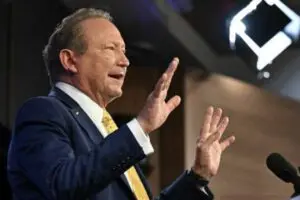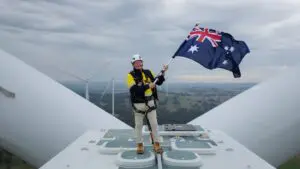Trains that run on green ammonia and hydrogen are the latest business venture for iron ore billionaire Andrew Forrest’s very busy green energy company, Fortescue Future Industries.
FFI and Deutsche Bahn have signed a letter of intent to work together on modified diesel train engines that use both of the new propellants, due to ammonia’s higher energy density than liquid hydrogen which makes it easier to transport and store.
The agreement also lays groundwork for fuel delivery and the creation of a “green supply chain”.
Deutsche Bahn says it’s looking at ways it can use hydrogen across its divisions and says, if any of these become viable, it could be a high volume customer for the fuel. It says both companies are investing a “mid-six figure sum” into the venture.
“We want to seize the opportunity to support the decarbonisation of the rail industry through developing multiple technologies,” Forrest said.
“Not every railway around the world will have as favourable topography as we do at our sites in Australia, therefore it makes sense to look at different technologies.”
An alternative to the “infinity train”
By “favourable topography,” Forrest is referring to Fortescue Metals’ zero emissions “Infinity Train,” a key rail decarbonisation technology that came with the company’s $US221 million purchase of Williams Advanced Engineering.
A RenewEconomy has reported, the infinity train proposes to use the height of Fortescue’s iron ore mines – up to 600m above sea level – and the weight of its load (34,000 tonnes) to provide “regenerative power” to its battery electric locomotives.
The idea is that these locomotives will generate enough power down hill to take the massive iron ore trains all the way to port, and put enough charge in the batteries so they can return the empty trains up hill to the mines. It could save 82 million litres of diesel a year. And Fortescue is hoping to have them on the tracks by 2024.
But, as Forrest notes, this is but one solution.
Hydrogen trains
The technology for the green fuel engine comes from Ammonigy, a company based in Stuttgart, which uses a cracker device to split part of the ammonia into hydrogen and nitrogen. The hydrogen is then mixed with the remaining ammonia as an ignition gas.
With a prototype engine undergoing testing, FFI will participate in endurance testing and emission measurements.
Hydrogen train engines are already in operation in Germany.
In August, train operator EVB began a regular service with hydrogen engines, replacing 15 diesel-powered trains in Lower Saxony’s local public transport system.
Deutsche Bahn is set to start testing its own hydrogen-powered regional machines in 2024.
Deals, deals, and more green hydrogen deals
Also on Wednesday, FFI announced another deal struck in Germany, this time a global strategic collaboration with Tree Energy Solutions (TES) to fast-track the development of a green hydrogen and green energy import facility in Wilhelmshaven on Germany’s North Sea coast.
FFI says an investment of €130 million (US$127 million) will be used to both fund the construction of the TES terminal and take a 30 per cent stake in Deutsche Grüngas und Energieversorgung GmbH – a subsidiary of TES that will build the Green Energy Hub.
The companies expect first delivery of green hydrogen into TES’ terminal in Wilhelmshaven to take place in 2026, with initial collaboration projects focused on Australia, Europe, the Middle East and Africa.
This agreement is the latest in a spate of deals FFI has signed around the work to investigate the possibilities for hydrogen fuel, with the most recent being an $80 million green hydrogen research arrangement in the US. The most likely is a $50 billion plan with E.ON to produce 5 million tonnes of green hydrogen annually by 2030, as the German energy giant looks for ways around Russian gas dependency.
The company is committed to producing 15 million tonnes of green hydrogen annually by 2030.










